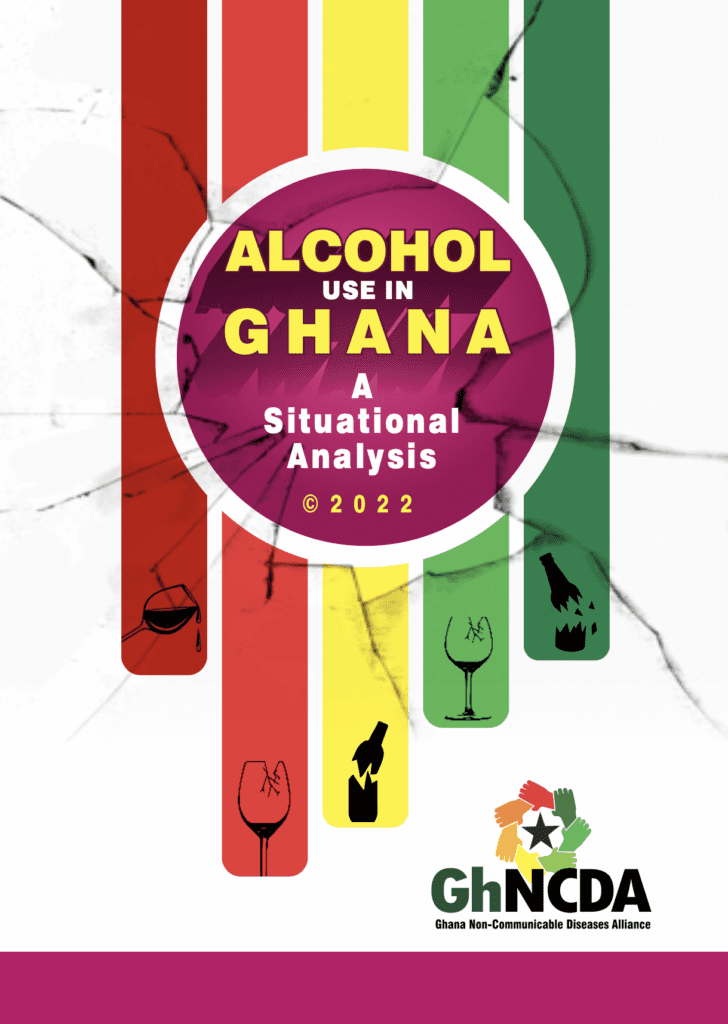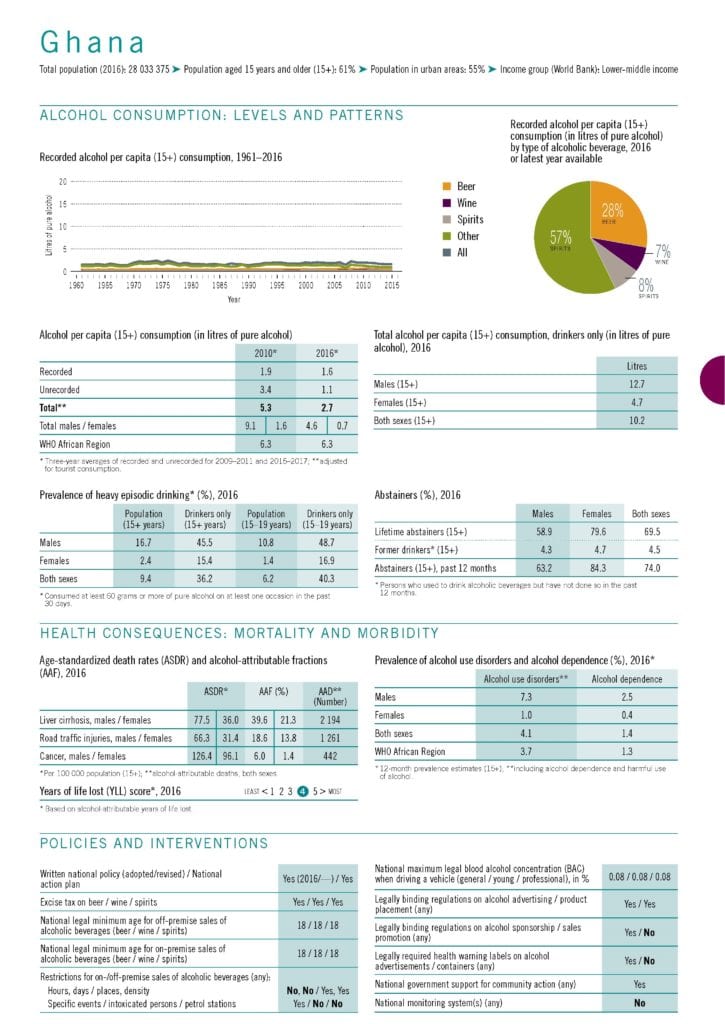Movendi International members, VALD and INSLA, in the Ghana Non Communicable Disease Alliance (GhNCD) and Ghana Alcohol Policy Alliance (GhanAPA) are advocating to advance alcohol policies in Ghana.
GhNCD realeases report on alcohol use in Ghana
The Ghana Non-Communicable Disease Alliance (GhNCD) launched the report titled “Alcohol Use in Ghana: A Situational Analysis” to provide critical evidence to advance efforts towards the adoption of the National Alcohol Regulations.

Through virtual connection, Movendi International’s Director of Strategy and Adovacy, Maik Dünnbier, joined the launch event and addressed the meeting with short remarks. Movendi International has supported the development of the study report with technical expertise.
The report also aims to highlight the impact of alcohol harm in all of Ghana.
- Alcohol consumption, while being lower in Ghana comparative to other nations in the WHO African region, still poses a significant threat to public health and the economy at large.
- In Ghana alcohol use is major risk factor for:
- non-communicable diseases (NCDs),
- road traffic crashes and fatalities,
- infectious diseases, and
- violence against women.
- About 9% of adults in Ghana are binge alcohol users.
- The majority of them are men.
- Alcohol use among teenagers is also high.
- Again the majority is male.
- Children and young people are heavily exposed to alcohol through,
- advertisements in the media,
- visible sales outlets in the communities, and
- relatives who consume alcohol.
- Mystery shopping surveys in Accra found that 88% of the time children between the ages of 12 to 16 years were able to purchase alcohol from liquor outlets.
- Alcohol use disorder and dependence are both higher in Ghana than the WHO African regional average.
- Major causes of alcohol consumption include,
- frequent and visible adverts,
- easy affordability of alcohol products,
- alcohol industry tactics,
- anxiety,
- depression, and
- unemployment.
- The alcohol industry utlized donations as a method of promoting brands during the COVID-19 pandemic.
- There is a small cross section of the population who were binge using alcohol during the COVID-19 pandemic.
- About 40% of the population are not aware about the harms caused by alcohol products.
- Implementation of the National Alcohol Policy is ineffective and lags behind WHO standards.
- While taxes are a key policy tool used by the government to reduce alcohol consumption they can also be improved.
Speaking at the launch of the report in Accra, the Deputy Minister for Health, Hon. Mahama Asei Seini noted the impact alcohol is having on the development of the country. He said that a concerted effort from everyone in Ghana is needed to overcome this harm.
Ghana has made some strides to improve their alcohol policies. Examples are:
- The development of the National Alcohol Policy,
- Implementation and enforcement of watershed legislation for alcohol advertising (prohibited between 6:00 AM and 10:00 PM on TV and Radio)
- Banning celebrities from promoting alcohol brands in alcohol adverts, and
- Drafting regulations for alcohol control.
However, more needs to be done. That is why it is important to implement the National Alcohol Regulations. As The National Coordinator of the GhNCDA Mr. Labram Musah – a member of Movendi International – explained that one of the reasons why the report was developed was to provide evidence to advance efforts toward the adoption of the National Alcohol Regulations.
This is included as one of the eight recommendations in the report:
- The government must finalise and adopt the alcohol regulation (legislative instrument) as a matter of urgency.
- Effective implementation of the National Alcohol Policy must be prioritized by all stakeholders.
- Taxes on alcohol could be raised further and be well targeted to specifically reduce alcohol consumption.
- Revenues from taxes on alcohol could be used to finance healthcare related to alcohol harm in Ghana.
- Rehabilitation and reformation centres must be resourced to treat people with alcohol use disorder and addiction.
- The social welfare department may also consider supporting children of parents with alcohol use disorder or addiction problems.
- Education and sensitization programmes on the negative consequences of alcohol use must be organized by the government and other stakeholders for the general population and children especially.
- Brewing of local alcoholic beverages should be well regulated by relevant authorities.
GhanAPA calls on the government to take action on those who are violating alcohol advertising laws
Ghana Alcohol Policy Alliance (GhanAPA) – a coalition of civil society organizations, many of which are Movendi International members, working towards alcohol policy improvement in Ghana – has called on the government to take action against alcohol industry actors who are violating alcohol advertising laws in the country.
Currently, Ghana has a ban on alcohol advertising between 6:00 AM and 10:00 PM on TV and Radio. However, Big Alcohol has found a way around this law. Hosts of TV and Radio programs sponsored by alcohol companies are repeatedly seen and heard marketing alcohol brands verbally while they are hosting during the restricted hours.
GhanAPA through this statement is calling on the attention of the Minister of Health to be aggressive on the online and traditional media advertising of alcohol by the alcohol industry,” said GhanAPA, in a statement as per Modern Ghana.
Ghana Alcohol Policy Alliance (GhanAPA)
The Alliance commends the Food and Drugs Authority (FDA) for their pro-activeness in recent years regarding alcohol policies on production, marketing, and sale. However, GhanAPA notes that the lack of legislation is making it harder to reduce alcohol demand and resulting harm in the country.
Six years have passed since the launch of the National Alcohol Policy (NAP). Despite this, the alcohol control regulations are not ready yet.
According to the World Health Organization (WHO), 40.3% of 15 to 19-year-old Ghanaian youth who consume alcohol engage in binge use. 7.3% of Ghanaian men suffer from alcohol use disorders and 2.5% of them are dependent on the substance.
In 2016, in Ghana alcohol caused:
- 2194 liver cirrhosis deaths,
- 1261 road traffic deaths, and
- 442 cancer deaths.
Considering this heavy alcohol burden affecting people and communities in Ghana, GhanAPA has issued two call:
- The Food and Drugs Authority (FDA) should take action against the indirect marketing of alcohol products during restricted hours in online and traditional media; and
- The Ministry of Health, the Attorney Generals Department, and the Ministry of Justice and Parliament should urgently take steps to ensure the drafting and adoption of public health-oriented alcohol policy solutions.
We are therefore calling on the Ministry of Health, Attorney Generals Department and the Ministry of Justice and Parliament to expedite actions to facilitate the drafting and adoption of an alcohol control legislation which should be modeled on public health interests,” said the GhanAPA, as per Modern Ghana.
Ghana Alcohol Policy Alliance (GhanAPA)
Movendi International members in Ghana have been tirelessly working to advance alcohol policy solutions in the country. As Movendi International previously reported, Vision for Alternative Development (VALD), a Movendi International member organization, has called the government, especially the Ministry of Health and the Food and Drugs Authority to finalize and enact the national alcohol regulations. They call for scientifically proven, highly effective alcohol policy solutions recommended by the WHO, best buys which include raising alcohol taxes, banning alcohol advertising, and reducing the availability of alcohol.
Last year, the International Monetary Fund (IMF) also called on the Ghanaian government to increase the alcohol tax to boost sustainable development through domestic resource mobilization.
These policy solutions have the support of the Ghanaian people who are majority alcohol-free. It is now necessary for policymakers to listen to their people and prioritize the health and well-being of Ghanaians by protecting them from the harms caused by the products and practices of the alcohol industry.
Sources
Capital News: “GhNCDA Moves To Regulate Alcohol Consumption In Ghana“
Capital News: “GRA initiates measures to halt smuggling of alcoholic products“
Ghana News: “Ghana NCD Alliance pushes for a Legislation to Control Alcohol Consumption in Ghana“
Ghana News TV: “LIVE: National Launch of a Study Report on Alcohol Use in Ghana; SITUATIONAL ANALYSIS“
Modern Ghana: “Alcohol still advertised between the restricted hours of 6.00am-10.00pm — says GhanAPA, calls for stiffer legislation“


